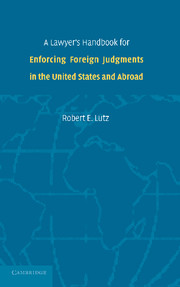Book contents
- Frontmatter
- Contents
- Preface
- Acknowledgments and Dedication
- Introduction
- PART ONE ENFORCING FOREIGN COUNTRY JUDGMENTS IN THE UNITED STATES
- PART TWO ENFORCEMENT OF JUDGMENTS ABROAD
- PART THREE THE FUTURE OF ENFORCING FOREIGN JUDGMENTS
- I Introduction
- II Hague Convention on Exclusive Choice of Court Agreements
- III International Jurisdiction and Judgments Project of the American Law Institute
- IV Revision of the Uniform Foreign-Money Judgment Recognition and Enforcement Act
- V International Trade Flexibility and Enforcing Foreign Judgments
- VI Conclusion
- Bibliography
- Index
IV - Revision of the Uniform Foreign-Money Judgment Recognition and Enforcement Act
Published online by Cambridge University Press: 16 November 2009
- Frontmatter
- Contents
- Preface
- Acknowledgments and Dedication
- Introduction
- PART ONE ENFORCING FOREIGN COUNTRY JUDGMENTS IN THE UNITED STATES
- PART TWO ENFORCEMENT OF JUDGMENTS ABROAD
- PART THREE THE FUTURE OF ENFORCING FOREIGN JUDGMENTS
- I Introduction
- II Hague Convention on Exclusive Choice of Court Agreements
- III International Jurisdiction and Judgments Project of the American Law Institute
- IV Revision of the Uniform Foreign-Money Judgment Recognition and Enforcement Act
- V International Trade Flexibility and Enforcing Foreign Judgments
- VI Conclusion
- Bibliography
- Index
Summary
THE UNIFORM ACT EXPERIENCE
In the 1960s, when the United States did not accede to any international agreements for the recognition and enforcement of civil judgments, the laws of the several states governed recognition and enforcement of civil judgments rendered abroad. This lack of national uniformity posed a problem in terms of having the judgments of the several states recognized in foreign countries, since the United States as a whole did not have reciprocal agreements with the other countries. The National Conference of Commissioners on Uniform State Laws (NCCUSL), an organization that develops uniform state laws by drafting and promulgating model/uniform acts, sought to remedy this problem for the individual states. Thus, in 1962, the NCCUSL drafted the Uniform Foreign Money-Judgments Recognition Act (UFJRA). The Act strove to codify the most prevalent common law rules regarding the recognition of foreign-country money judgments to satisfy reciprocity concerns of foreign courts, thus making it more likely that money judgments rendered in the states would be recognized in other countries.
The (UFJRA) details the circumstances under which the courts in states adopting the Act must recognize foreign country money judgments. Although under the UFJRA, foreign country judgments rendered according to its provisions must be recognized by the courts of adopting states, courts also have discretion under the Act with respect to recognizing foreign country judgments that do not meet certain requirements.
- Type
- Chapter
- Information
- Publisher: Cambridge University PressPrint publication year: 2006



